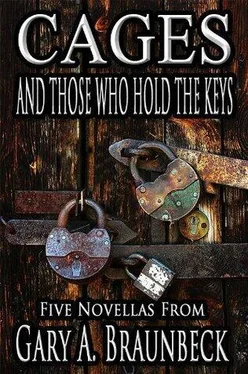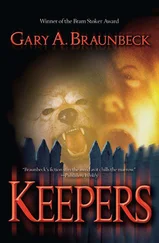“Why? It’s not like that was his fault.”
“Try telling him that!” said Laura. “At first I thought it was just the natural guilt someone feels when a parent dies, you know? ‘I should have been around more.’ That sort of thing.”
“And now?”
“It’s turning into a real problem. He can’t stop thinking about it. He’s had two states for the last week: he’s either screaming at me like a lunatic or he’s damn near catatonic.” Marian looked over at her brother, who was sitting very still, staring down into his drink, not looking up, not saying a word. “Like now?” she asked Laura. “Like now.”
After the cautious kisses and awkward embraces she bid goodbye to her Dad, promising to write and call every week, and returned to Connecticut to resume rehearsals.
Though she did write, somehow the time to call became nonexistent during the hectic first weeks after the show hit the road, but Marian didn’t worry over it; everyone had a copy of the schedule and knew where the show would be and when. If there was any problem Alan would call her. Or Laura would do it for him.
So she didn’t worry. She also never really mourned her mother, though she loved her very much; from what Laura had said, Alan was mourning enough for the whole family.
She worried over her brother, but not too much. It seemed self-defeating.
The tour completed its first seven-month run well in the black; both Marian and Anna— the woman playing Thelma opposite her, a well-known soap-opera actress whose name on the marquee was the box-office draw— renegotiated their contracts for a second tour to commence six months down the line. During the break Marian appeared in an Equity dinner theatre production of Peter Schafer’s Black Comedy in her first true ingenue role. The notices were excellent, and by the time the production closed Marian’s reputation as an Actress To Watch was established.
Ten days of rehearsal was all it took for her and Anna to get their chemistry going again, and by the time the play began its second, sold-out tour, they were performing better than either of them ever had before.
Then came the night in Boston that Anna buckled over backstage one night after the curtain call, complaining of chest pains. She was taken to the hospital where she was diagnosed with angina. With only one performance left at the current stop, the producers decided Anna’s understudy would go on the next night; after that, they wouldn’t say.
Two hours later, after Marian and an admirer from the audience— a sinewy, rugged man named Joseph Comstock— had brought each other home (rather noisily) in her hotel bed, the phone rang and she answered it, sweaty, sore, and out of breath.
As she brought the receiver up to her face, she caught a glimpse of the small digital clock/calendar on the bedside table and noted, for some reason, that it was the same date as her mother’s death nearly two years ago.
She listened as her aunt gave her the news.
Dad would now be keeping Mom company. Marian hung up and lay in Joseph’s arms, thinking: Father, my dear father. Where are you now?
Joseph stayed for the rest of the night, comforting her, listening to her, but becoming more and more pensive as morning approached. As he was dressing to leave Marian realized— with much surprise— that she felt much better.
She wanted very much to see him again after that evening’s performance, and he nodded his mute agreement. The funeral would be the day after tomorrow, so Marian planned to do one more performance then have her understudy take over for two nights while she went home. The fact that Joseph Comstock— this wonderful, understanding man— would come again tonight and see her through gave her some strength.
One of the most curious things about human behavior is how people will form a bond with those nearest them when bad news hits; the comforting words of an acquaintance suddenly become a declaration of love and caring never before imagined, the empathetic embrace of a friend becomes a life preserver thrown out before the third sinking, and the companionship of a stranger, a stranger who listens and who in their silence seem to give so much, this companionship often becomes the only thing one can count on until the storm has passed. Marian suddenly felt as if she’d been with Joseph Comstock all her life, and on that morning she felt secure.
Something in his face and behind his eyes told her that he knew her, and that she was being looked after.
He didn’t show up for the performance that night, nor did he appear afterward. Marian returned to her hotel room alone. She watched television until nothing but snow stood before her gaze, and sometime around six a.m. fell into an uncomfortable sleep.
She was awakened a little after ten by her understudy knocking on the door. Marian rose, still groggy, threw on her bathrobe, and answered.
Her understudy told her how sorry she was about Marian’s dad. Marian thanked her for her sympathy, wondering why her understudy hadn’t simply called.
“Have you seen this morning’s paper?” she asked Marian.
“I don’t usually bother with local papers when we’re there less than two weeks.”
Saying nothing, her understudy handed Marian a copy of the morning edition, the lower half of the front page facing up. Marian took it, read the bold-faced words above the story, and felt her knees begin to buckle.
There was a picture of her sweet admirer next to an old photo of a house that had seen better days. A quick glance at the headline— MAN KILLS WIFE, CHILDREN, SELF— and the next thing she remembered was her understudy leading her back to the bed. Somewhere between dressing and talking to the police she threw up, but when she finally boarded the plane for home, Marian found that she didn’t feel quite so bad anymore. A little shaky, yes, but not bad.
Not bad at all.
Until she found herself in the living room of her family’s house, on her knees and staring at the quilt-patch that her mother had made from her graduation gown, depicting a lone shadow-figure standing on a stage beneath the brightly focused beam of a spotlight, staring at this patch so she wouldn’t have to acknowledge the thing in her peripheral sight....
4
Cut squares and nip off the corners, then chain pieces by picking up two squares at a time so they don’t shift out of alignment. Alternate the fabric that is on top (this pair light on top, that pair dark). The chain can be as long as you want.
* * *
Jack’s crescent mouth grew wider, a hideous phantasm of a smile. “Jack Pumpkinhead still works fine, honey,” he said with that voice , then strode into the front room and filled his hands with candy and seeds before opening the front door.
Before Marian could move, Alan was behind her, one arm around her waist, the other across her collarbone, his hand covering her mouth. “Don’t make a sound,” he said. “I don’t want to frighten the kids.” Then: “I sent a telegram to your hotel in Boston the day your company arrived there. That was five days before Dad died, almost a week before Aunt Boots called to give you the news. So don’t bother lying to me about how you didn’t know in time, okay?”
Outside, the children were going ooooh and aaaah at the sight of Jack as he distributed the treats. “Well, lookee what we got here,” said Jack. “Is that a witch I see?” Giggles and cackles. “And what’s this? Old Count Dracula come to sink his fangs?”
More giggles, excited whispering, the sound of wrapped candy softly plopping into paper bags as Jack lowered his voice and spoke to the children like a co-conspirator. “Come to the shortcut in the cemetery tonight and I’ll have more surprises for you and your folks— make sure you bring ’em along. We’re gonna have a bonfire and tell ghost stories. Remember to bring your pumpkins and your magic seeds.” A soft, spattering sound— pumpkin seeds being sprinkled into each waiting bag.
Читать дальше












